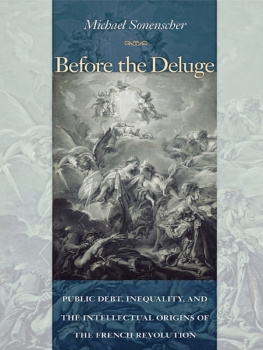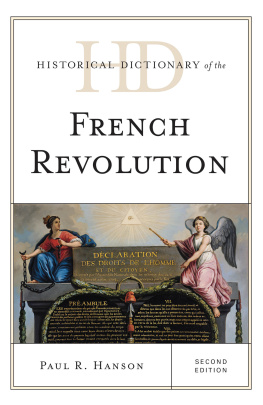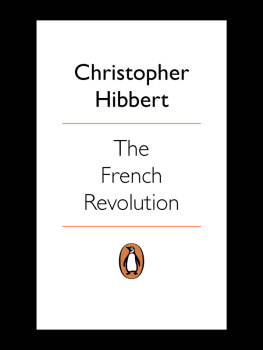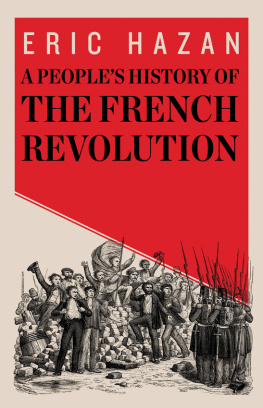Before the Deluge



COPYRIGHT 2007 BY PRINCETON UNIVERSITY PRESS PUBLISHED BY PRINCETON UNIVERSITY PRESS, 41 WILLIAM STREET, PRINCETON,
NEW JERSEY 08540
IN THE UNITED KINGDOM: PRINCETON UNIVERSITY PRESS, 3 MARKET PLACE,
WOODSTOCK, OXFORDSHIRE OX20 1SY
ALL RIGHTS RESERVED LIBRARY OF CONGRESS CATALOGING-IN-PUBLICATION DATA
SONENSCHER, MICHAEL.
BEFORE THE DELUGE:
PUBLIC DEBT, INEQUALITY, AND THE INTELLECTUAL ORIGINS OF THE FRENCH REVOLUTION / MICHAEL SONENSCHER.
P.CM.
INCLUDES BIBLIOGRAPHICAL REFERENCES AND INDEX.
eISBN: 978-1-40082-770-1
1. FRANCEHISTORYREVOLUTION, 17891799CAUSES. I. TITLE.
DC138.S57 2007
944.04DC222006016623
BRITISH LIBRARY CATALOGING-IN-PUBLICATION DATA IS AVAILABLE
THIS BOOK HAS BEEN COMPOSED IN JANSON TYPEFACE
PRINTED ON ACID-FREE PAPER.
PRESS.PRINCETON.EDU
PRINTED IN THE UNITED STATES OF AMERICA
13579108642

CONTENTS
ACKNOWLEDGEMENTS
IAM grateful to the Provost and Fellows of Kings College, Cambridge for the many different resources that they have madeavailable to me over the years, and, more particularly, to my colleagues Stephen Alford and Melissa Lane for their kindnessin taking on my usual administrative responsibilities while I was writing this book. I am also greatly indebted to the Artsand Humanities Research Council and, in its former incarnation, the British Academy for the financial support that enabledme to collect much of the material referred to in what follows. I have relied very heavily upon the goodwill and active helpof the many librarians and archivists responsible for the collections on which I have drawn, and I am most grateful to themall. I would also like to thank the Hackett Publishing Company for allowing me to use passages from the introduction to mytranslation of Sieys: Political Writings (Indianapolis, Hackett, 2003), and the editors and publishers of the following previously published articles or chapters fortheir generosity in allowing me to reproduce passages from them: The Nations Debt and the Birth of the Modern Republic:The French Fiscal Deficit and the Politics of the Revolution of 1789, History of PoliticalThought 18 (1997): 64103, 267325; Fashions Empire: Theories of Foreign Trade in Early Eighteenth-Century France, in Robert Foxand Anthony Turner, eds., Innovation and Markets in Eighteenth-Century France (London, Hambledon Press, 1998); and Property, Community and Citizenship, in Mark Goldie and Robert Wokler, eds., The Cambridge Historyof Eighteenth-Century Political Thought (Cambridge, Cambridge University Press, 2006).
I have learned a great deal over the years from conversations with Keith Michael Baker, John Dunn, Bianca Fontana, RaymondGeuss, Ross Harrison, Bernard Manin, Pasquale Pasquino, Munro Price, Emma Rothschild, Gareth Stedman Jones, and Richard Tuck.I have also benefited from conversations with Maxine Berg, Lesley Millar, and Katie Scott about the arts and the luxury tradesin the eighteenth century. One intermittent conversation, with my friend Colin Jones, now extends over thirty years. As anotherfriend, Anna Hont, has often reminded me, I have been lucky in many ways and particularly so for having been able to enjoyhis unfailingly generous intellectual and personal companionship over so many years. I am grateful, too, to Edward Castleton,Rachel Hammersley, Bla Kapossy, Ruth Scurr, and Richard Whatmore for many helpful discussions about some of the topics addressedin this book and for the items of information that, from time to time, they were kind enough to pass on to me. Jacques Guilhaumoukept me regularly informed of his own publications on Sieys,while Lo[Iuml]c Charles and Catherine Larrre did the same withtheir publications on eighteenth-century French political and economic thought. I have also gained a great deal from supervisingthe work of Stephen Butler, Andrew Glencross, Isaac Nakhimovsky, and Jaikumar Ramaswamy. It may be a dangerously double-edgedgesture to say that I genuinely could not have written a book like this without the years of conversation that I have hadwith my friend and colleague Istvan Hont. It should be taken to refer to what he taught me to think about and aim for, notto what, in the end, I may have managed to do. I am particularly indebted to him and to Eliza-beth Allen, Richard Bourke,WilliamDoyle, Colin Jones, and Bla Kapossy for their comments on parts or all of earlier drafts of the text, to Keith Michael Bakerand Ed Hundert for their very helpful, initially anonymous, readers reports after the text was submitted, and to Ian Malcolmat the Princeton University Press for his editorial guidance and commitment in turning the typescript into a book. It is alsoa real pleasure to thank Lauren Lepow at Princeton for her professional skill, attention to detail, and in-variably helpfulguidance in preparing the text for publication. I am grateful, as well, to Amelia Jackson at the British Museum for her invaluablehelp in locating the image used on the dust jacket, and to Richard Bourke for his advice on translations of Greek and Latinterms. Thanks, too, to various individuals at Thomson Gale who were kind enough to allow me to have more or less uninterruptedaccess to their on-line database, ECCO, before it became generally available to British universities under the terms of anagreement that will, I hope, be a precedent for making other electronic databases nationally accessible for research. I alsoowe a debt to John Robertshaw and Michael Thompson (not, I hope, literally) both for what they have taught me about eighteenth-centuryFrench books and, especially, for what passes for polite repartee in the book trade. Thanks, too, to the personnel of WalterPurkis & Sons of Muswell Hill for both the fish and the songs. All this should make it clear that the many remaining faultsin this book really are my own.

INTRODUCTION
THE phrase apre[grave]s moi, le dluge (after me, the deluge) is sometimes attributed to Louis XV, Francs penultimate eighteenth-century king. It seems, however,to have been coined by his mistress, Mme de Pompadour, and she seems to have used it to refer to us, not me (as in aprsnous, le dluge).
This is a book about how this kind of vision of the future was registered in eighteenth-century thought, and, more specifically,about how it can be connected to the political thought of the period of the French Revolution. Its argument, outlined in whatfollows in this introduction, can be summarised quite briefly. It is that the modern idea of representative government,notablythe one developed by the abbEmmanuel-Joseph Sieys, owes rather more than it may now seem to the type of future-orientedspeculation about public debt that, among other things, was captured by the phrase aprs moi, le dluge.
The two faces of public credit go some way towards explaining why, in the eighteenth century, thinking about politics couldsometimes take place under the sign of a biblical flood. This strand of thought may look like the other side of the Enlightenment,but it did, in fact, form part of the context that gave that well-worn word much of its original theological and teleologicalcharge. Referring to enlightenment,
Next page















